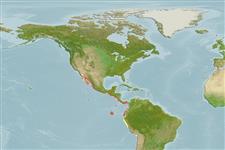Common names from other countries
>
Eupercaria/misc (Various families in series Eupercaria) >
Labridae (Wrasses) > Corinae
Etymology: Thalassoma: Greek, thalassa = the sea + Greek, soma = body; the colour of the sea (Ref. 45335).
More on author: Gill.
Environment: milieu / climate zone / depth range / distribution range
Ecología
marino asociado a arrecife; rango de profundidad 0 - 64 m (Ref. 9311), usually 2 - 25 m (Ref. 27115). Tropical; 20°C - 24°C (Ref. 27115); 33°N - 19°S, 114°W - 70°W
Eastern Pacific: Gulf of California to Peru, including the Galapagos.
Tamaño / Peso / Age
Maturity: Lm ? range ? - ? cm
Max length : 15.0 cm TL macho / no sexado; (Ref. 9311)
Forms small aggregations over reefs. Feeds on suspended plankton and small hard-shelled invertebrates. Not utilized for human consumption.
Life cycle and mating behavior
Madurez | Reproducción | Puesta | Huevos | Fecundidad | Larva
Pelagic spawner. Sex reversal is completed in 2-6 weeks (Ref. 34185, 32213).
Gomon, M.F., 1995. Labridae. Viejas, doncellasas, señoritas. p. 1201-1225. In W. Fischer, F. Krupp, W. Schneider, C. Sommer, K.E. Carpenter and V. Niem (eds.) Guia FAO para Identification de Especies para lo Fines de la Pesca. Pacifico Centro-Oriental. 3 Vols. FAO, Rome. (Ref. 9311)
IUCN Red List Status (Ref. 130435)
CITES (Ref. 128078)
Not Evaluated
Threat to humans
Harmless
Human uses
Acuario: Comercial
Más información
ReferenciasAcuiculturaPerfil de acuiculturaRazasGenéticaElectrophoresesheritabilidadEnfermedadesProcesamientoMass conversion
Herramientas
Special reports
Download XML
Fuentes de Internet
Estimates based on models
Preferred temperature (Ref.
115969): 21.4 - 28.7, mean 26.4 (based on 52 cells).
Phylogenetic diversity index (Ref.
82804): PD
50 = 0.5000 [Uniqueness, from 0.5 = low to 2.0 = high].
Bayesian length-weight: a=0.00813 (0.00452 - 0.01462), b=3.00 (2.85 - 3.15), in cm Total Length, based on LWR estimates for this species & Genus-body shape (Ref.
93245).
Nivel trófico (Ref.
69278): 3.5 ±0.41 se; based on food items.
Resiliencia (Ref.
120179): Alto, población duplicada en un tiempo mínimo inferior a 15 meses (Preliminary K or Fecundity.).
Fishing Vulnerability (Ref.
59153): Low vulnerability (10 of 100).
